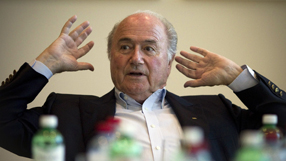Blatter cleared in bribery investigation
ZURICH - FIFA's Ethics Committee cleared president Sepp Blatter of any wrongdoing as two of football's most senior officials were suspended on Sunday in the worst corruption scandal to blight the sport's governing body.

Qatari Mohamed Bin Hammam, who hours earlier had ended his campaign to unseat Blatter, was temporarily suspended along with Jack Warner, president of the CONCACAF region covering north and central America and the Caribbean.
Blatter was cleared of any breach of FIFA's statutes following an emergency sitting of the independent committee, freeing him to stand unopposed for a fourth term in charge of FIFA in Wednesday's election.
Bin Hammam and Warner were accused of arranging to pay delegates of the Caribbean Football Union $40,000 in cash to vote for Blatter's only rival.
Both men are long-standing members of FIFA's all-powerful 24-man executive committee, 10 of whom have been subject to allegations of corruption in the last year.
Bin Hammam, head of the Asian Football Confederation, and Warner, a government minister in his native Trinidad & Tobago, are now temporarily suspended from any football-related activity.
Both will be absent from the Congress where Blatter can expect to be re-elected to the post he has held since 1998.
The case against Warner and Bin Hammam, who have denied any wrongdoing, will be heard in July, according to Namibian judge Petrus Damaseb who chaired Sunday's meeting.
Get FourFourTwo Newsletter
The best features, fun and footballing quizzes, straight to your inbox every week.
"KANGAROO COURT"
Warner was furious at the outcome and told Reuters he had been the victim of a kangaroo court.
"Blatter has to be stopped," he said of his former long-term ally. "They came premeditated, they weren't prepared to listen, they were hand-picked to do a task and they did just that," he said of the hearing.
"The guys were hand-picked by Blatter... a kangaroo court would be a decent thing to say."
FIFA Secretary General Jerome Valcke, who faced tough questioning during a feisty hour-long news conference, said the election would go ahead unless three-quarters of the 208 delegates voted to change the agenda.
"I am not FIFA, I can't change the agenda," Valcke said. "It is up to the delegates - they have the final say."
Valcke agreed that FIFA was facing "a watershed moment," drawing comparisons with the International Olympic Committee's crisis when IOC delegates were found guilty of taking bribes for votes to award the 2002 Winter Games to Salt Lake City.
This crisis, whose tentacles spread into the very heart of the senior governance of the world's most popular and richest sport, has arguably greater implications.
Unlike fairly anonymous IOC officials, Blatter is the most famous sports politician in the world, has worked for FIFA for more than 35 years and been president for the last 13.
During his time in charge, FIFA has grown rich through sales of TV rights, sponsorship and merchandising opportunities and currently boasts reserves of over $1 billion.
While FIFA's financial situation is sound, recent scandals have provoked widespread calls for reform of the powerful executive committee at the organisation's heart.
